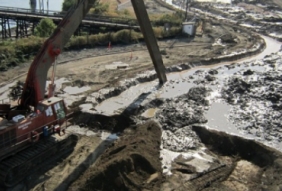
Posted on June 27, 2016
The Portland Harbor Community Advisory Group held a public forum Tuesday night at Hariet Tubman Middle School to provide a better understanding for the community about the Environmental Protection Agency’s Superfund plan to decontaminate certain areas of the Willamette River.
On June 8, the EPA proposed a $746 million plan that would clean up a 10-mile stretch of the river, kicking off a 60-day comment period that allows the public to express their thoughts, opinion and concerns about the plan. EPA is then legally obligated to look over and consider the community’s input.
Peter deFur, a noted Superfund expert from the University of Virginia Commonwealth, says EPA promises to have considered the community’s input and make a decision on the final plan by the end of the year.
“If they do that it would be record-setting,” deFur says. “It usually takes a year for that process.”
This suggests that EPA has already made up its mind on the plan and is not going to consider the public’s input, says Bob Sallinger, the conservation director for Audubon Society of Portland, who presented at the forum.
EPA’s plan suggests dredging, removing some of the worst contaminated areas from the river’s soil, capping, covering up and sealing other sections and monitored natural recovery, leaving most of the river to fix itself while keeping an eye on it.
deFur says monitored natural recovery won’t work for the Portland Harbor area of the river because some of the hazardous compounds found in the river are not able to break down naturally, such as metals. Polychlorinated biphenyls (PCBs) are the main compound found in the river and “break down so slowly that they might as well be considered metals,” deFur says.
EPA’s plan suggests 86 percent of the selected area will be left to fix itself, which means only 14 percent of the contaminated areas will be dredged and capped, he says.
Community members wanted to know if there was a better option, what they could do to convince EPA to consider a more effective option and is the best option going to be worth it.
deFur says he does not yet have an answer to whether the most extensive cleanup will be worth it, but he believes something needs to be done.
“If you destroy your resource today, it’s gone forever. If you restore your resource today, it is multiplied forever,” he says.
The most thorough clean up is the most expensive. It would cost $9 billion to dredge and cap the entire 10-mile area.
Companies and government agencies along the Portland Harbor that have contributed to the pollution, by dumping things into the river or the soil from underneath their plant, or leaking pollutants into the river, will be paying for the cleanup.
Some of the responsible companies who will fund the clean up are Chevron Corp., NW Natural, the Port of Portland, Union Pacific Railroad, Gunderson LLC and the city of Portland.
The main concerns are the health risks for humans and the river’s habitat. The main health hazard is fish from the river. A person is recommended to eat only 8 oz. a month of fish from the Portland Harbor due to the high level of metals, PCBs and 80 other compounds, Sallinger says.
The advisory group informed community members on how to submit their comments to the EPA before the 60-day comment period ends on August 8.
“Remind them that this is your river,” says Travis Williams of Willamette Riverkeeper, who presented at the forum.
Sallinger says a request for an extension to a 120-day comment period was put in to EPA because 60 days is “not enough time for the public to really understand and comment on the plan.”
He says EPA responded, saying they will let him know in a week or two if they will allow an extension.
Source: Portland Tribune





